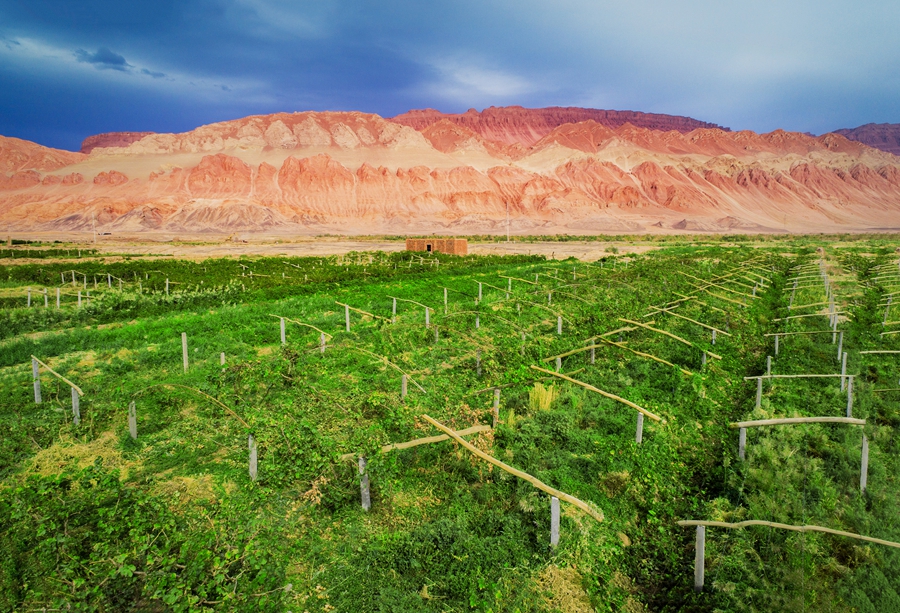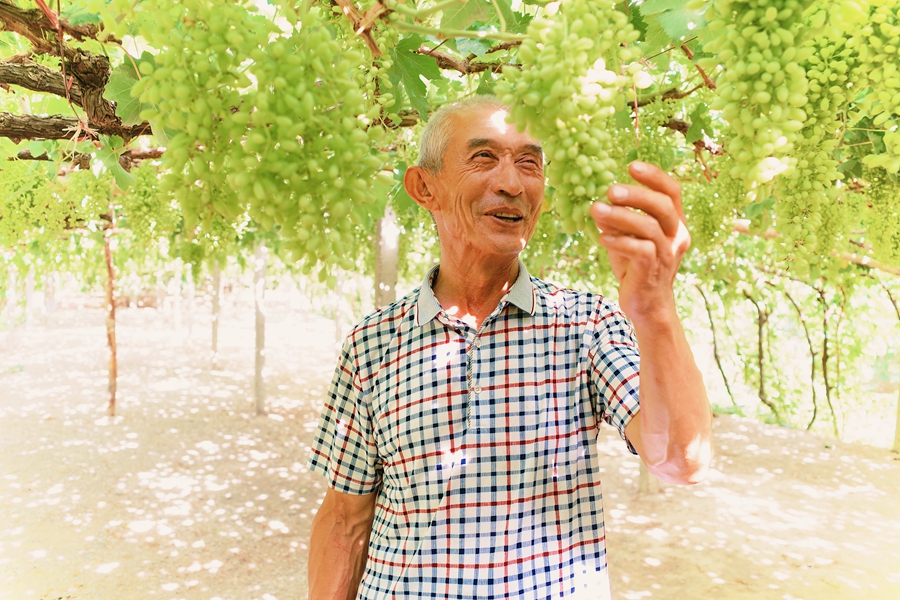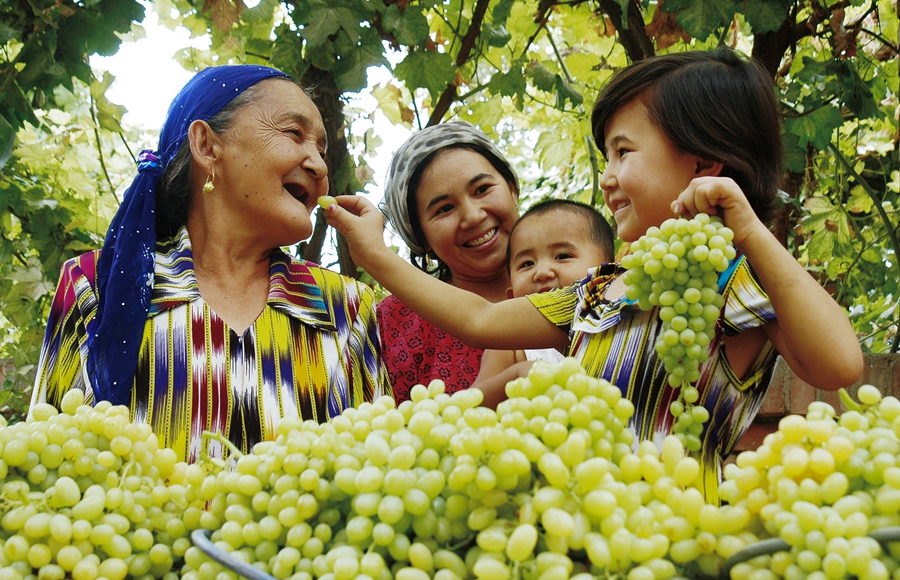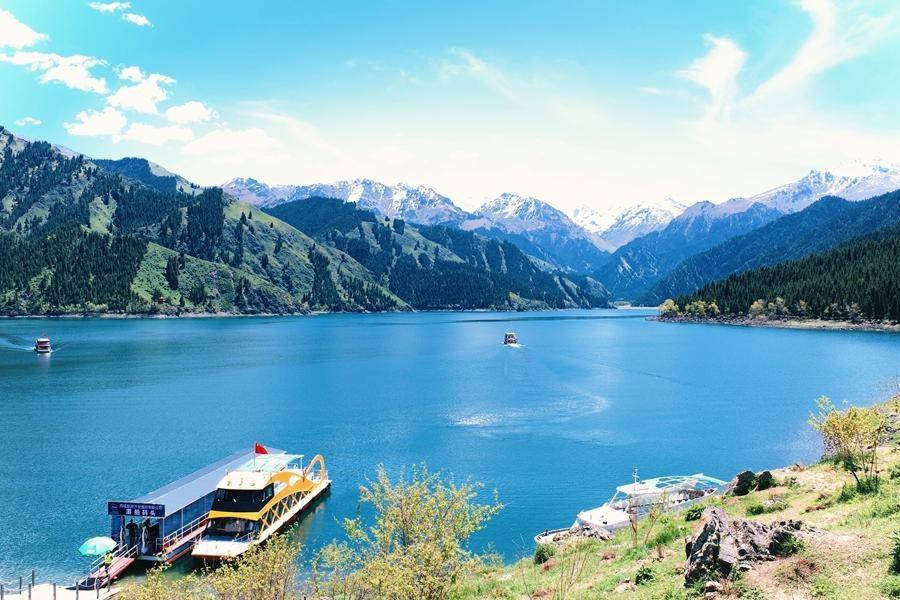The grapes of wealth: a glimpse into Xinjiang’s agricultural industries

Turpan is famous for its delicious grape.
If Xinjiang ever developed a vineyard rating system, 58-year-old Ablet Yunus’ orchard would be classified as one of the best. Clusters of juicy grapes spread out proudly through his vast plantation, each one bursting with Turpan’s summer sweetness. From bright soulful greens to deep emerald hues, the grapevines are a divine palette for the eyes, bringing a beauty that sprung from seeds blessed with the dazzling sunshine and fertile lands of Turpan.
Nestled among the Flaming Mountain and gurgling brooks, Yunus’ vineyard is a calling card of Turpan, one of China’s largest grape growing and raisin producing areas. The region produces 52.84 percent of Xinjiang’s grapes, accounting for over one fifth of China’s grape production. There are over 38,000 hectares of vineyards and more than 500 kinds of grapes in Turpan, growing over 1.2 million tons of grapes in 2020.
Today, Turpan is not only famous for its delectable fruit, but also its booming e-commerce, grape-themed cultural events and ecological tourism, as well as its growing wine industry. Its grapes, raisins, wines, and grape-themed festivals have become representative of Xinjiang’s agricultural upgrading.
The grapes of happiness

58-year-old Ablet Yunus is now an internet celebrity, known as “Turpan grape uncle.” (People's Daily Online/Kou Jie)
Yunus has grown grapes for over 25 years, and started with a small plantation of 0.2 hectares. The grape he used to grow was a local variety that was sour and hard to preserve, leading to an annual income of only 2,500 yuan.
“No one wanted our fresh grapes because they were not very tasty. I had to dry my grapes into raisins, which were much cheaper than fresh grapes. I was really upset and wanted to give up the grape business at that time,” said Yunus.
The lack of modern agricultural technologies also held back Yunus’ grape business. He recalled that decades ago, grapes in Turpan were grown in a very primitive and low-yield way. The leaves and vines grew and crawled around in a disorderly manner, while the grapes pressed into each other and easily became rotten.
The situation started to change when Turpan authorities introduced improved varieties and modern technologies to the locals in the 1990s, creating new hybrids between foreign varieties and local grapes. In just a few years, over 500 varieties of grapes were grown across Turpan, while Yunus, who joined study groups arranged by local authorities, has now become a specialist in growing Centennial Seedless, an American breed of sweet grape.
According to Yunus, technology and brand awareness are the secret weapons that have helped Turpan grapes earn their global reputation. With his vineyard of 0.4 hectares, he can now earn over 130,000 yuan per year, while his 60 students from across Xinjiang are now spreading his experience to help more grape growers.
“It took me years to practice and bring forward new ideas on growing Centennial Seedless grapes and now I want to share my knowledge with my neighbours and friends,” said Yunus.

34-year-old Zhu Huating, a social media influencer from Jiangsu Province, has helped Yunus promote his grape brand. (People's Daily Online/Kou Jie)
Live-streaming with her two partners in Yunus’ vineyard, 34-year-old Zhu Huating, a social media influencer from Jiangsu Province, has helped Yunus promote his grape brand. With the help of e-commerce, Turpan’s fresh grapes are now sold in every corner of China and even abroad, generating a higher income for the locals.
“Due to the lack of publicity and modern logistic services, local grape growers used to dry their fresh grapes into cheaper raisins, as they can be kept for a longer time. Now thanks to online streaming, we can help the locals sell their fresh grapes at a higher price,” said Zhu.
Today, thanks to the convenience brought by the highway system, grapes from Turpan can be sent to Xi’an within 36 hours. From Xi’an, the grapes can be dispatched to any corner of China within one day, providing grape growers like Yunus a bigger market for their goods.
With the help of modern technologies, Yunus’ perfectly trimmed and juicy grapes have now become a calling card of Turpan. Each year, he can grow around 20,000 tons of grapes on his vineyard, which can sell out within days. He is now an online celebrity, known by internet users as “Turpan grape uncle.”
“Grapes in Turpan are huge and sweet, as sweet as my happy life,” said Yunus.
Fruits of success

The wine industry has been designated as one of the ten crucial industries in Xinjiang’s 14th five-year-plan (2021-2025).
Miles away from Yunus’ vineyard, a group of tourists from Zhejiang Province are tasting wine at Huoshanhong, one of Turpan’s 21 boutique wineries. In its underground wine cellar is Turpan’s pride, bottles upon bottles of vineyard gold. The wine is the quintessence of Turpan’s concentrated sunbeams, as well as an example of Xinjiang’s upgraded agricultural industry.
“Turpan has a long tradition of grape cultivation, but is still very new to wine production. It has the same latitude as Bordeaux, which gives the land plenty of sunshine. Turpan produces 50 million litres of wine annually. We have over 200 kinds of wine, and the number is expected to grow significantly in the next five years,” said Chen Guangyao, vice mayor of Turpan.
According to Chen, the wine industry has been designated as one of the ten crucial industries in Xinjiang’s 14th five-year-plan (2021-2025), while Turpan is expected to have 100 boutique wineries by 2023, garnering over 10 billion yuan by 2025.
“We are now using the Internet to promote our wine. We have already trained over 200 social media influencers who are familiar with Turpan’s wine history and industry. We are planning to hold at least 100 online wine sales this year,” said Chen.

At the Huoshanhong winery’s holiday resort in Turpan, 192 barrel-shaped oaken huts are now open to the public, with a unique painting of Turpan’s nature and historical sites in each room. (People's Daily Online/Kou Jie)
In addition to the wine industry, Turpan has also made efforts to integrate its wine culture with the local tourism industry as a way to help increase the incomes of local residents. At the Huoshanhong winery’s holiday resort, 192 barrel-shaped oaken huts are now open to the public, with a unique painting of Turpan’s nature and historical sites in each room. The booming cultural tourism sector attracted over 620,000 tourists to visit Turpan during the five-day Labor Day holiday in 2021, up 36.59 percent from 2020.
Jin Hong, a 48-year-old businesswoman from Zhejiang Province, invested over 10 million RMB to build a boutique hotel in Turpan’s Grape Valley in 2018. With its Uyghur-style decorations and furniture, as well as its fine wine and delicious grapes, the hotel has become a calling card, attracting visitors from across China.

The booming cultural tourism sector attracted over 620,000 tourists to visit Turpan during the five-day Labor Day holiday in 2021, up 36.59 percent from 2020.
According to statistics, Turpan now has 467 guest houses and 31 boutique hotels. Its cultural tourism industry has provided jobs for over 80,000 locals, many of whom are from low-income families.
“Most of our clients are tourists who want to see authentic Uyghur culture and to taste Turpan’s specialty – grapes. Turpan’s booming cultural tourism sector has brought a lot of income to both locals and investors like me,” said Jin.
Photos
Related Stories
- British report over Xinjiang wantonly interferes in China's internal affairs: Chinese Embassy
- PLA holds intensive drills in northwest plateau, tests new weapons, tactics
- View along Duku Highway in China's Xinjiang
- Xinjiang People refute lies about Xinjiang with facts
- Official Trailer: A journey to China’s west to rediscover Xinjiang
Copyright © 2021 People's Daily Online. All Rights Reserved.










